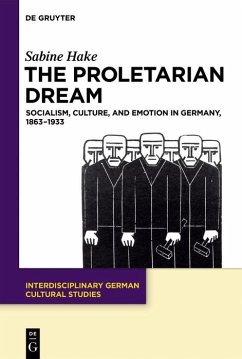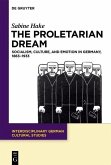The proletariat never existed-but it had a profound effect on modern German culture and society. As the most radicalized part of the industrial working class, the proletariat embodied the critique of capitalism and the promise of socialism. But as a collective imaginary, the proletariat also inspired the fantasies, desires, and attachments necessary for transforming the working class into a historical subject and an emotional community. This book reconstructs this complicated and contradictory process through the countless treatises, essays, memoirs, novels, poems, songs, plays, paintings, photographs, and films produced in the name of the proletariat. The Proletarian Dream reads these forgotten archives as part of an elusive collective imaginary that modeled what it meant-and even more important, how it felt-to claim the name "proletarian" with pride, hope, and conviction. By emphasizing the formative role of the aesthetic, the eighteen case studies offer a new perspective on working-class culture as a oppositional culture. Such a new perspective is bound to shed new light on the politics of emotion during the main years of working-class mobilizations and as part of more recent populist movements and cultures of resentment.
Aldo and Jeanne Scaglione Prize for Studies in Germanic Languages and Literatures 2018
Aldo and Jeanne Scaglione Prize for Studies in Germanic Languages and Literatures 2018
Dieser Download kann aus rechtlichen Gründen nur mit Rechnungsadresse in A, B, BG, CY, CZ, D, DK, EW, E, FIN, F, GR, HR, H, IRL, I, LT, L, LR, M, NL, PL, P, R, S, SLO, SK ausgeliefert werden.
"Dieser eher unauffällig daherkommende historische Band über den "proletarischen Traum" ist 200 Jahre nach Marx' Geburt und 50 Jahre nach "1968" ein hoch politisches Buch - mit der interessanten Frage, wie sich der Sozialismus als soziale Bewegung über seine kulturellen Diskurse und Praktiken in die deutsche Geschichte eingeschrieben hat. [...] Sabine Hakes angekündigtes Folgebuch über den "proletarischen Traum" von 1933 bis zum Ende der 1980er-Jahre kann mit Spannung erwartet werden."
Rebecca Menzel in: h-soz-kult, 10.04.2018, http://hsozkult.geschichte.hu-berlin.de/rezensionen/2018-2-017
"But labour historians might also welcome the opportunity for dialogue with new methodologies and new analytical foci that Hake's work offers -such a dialogue might help to refresh a field of history which has been relatively neglected in much recent historiography."
Andrew G. Bonnell in: European History Quarterly 49.1 (2019), 127-129
Rebecca Menzel in: h-soz-kult, 10.04.2018, http://hsozkult.geschichte.hu-berlin.de/rezensionen/2018-2-017
"But labour historians might also welcome the opportunity for dialogue with new methodologies and new analytical foci that Hake's work offers -such a dialogue might help to refresh a field of history which has been relatively neglected in much recent historiography."
Andrew G. Bonnell in: European History Quarterly 49.1 (2019), 127-129









